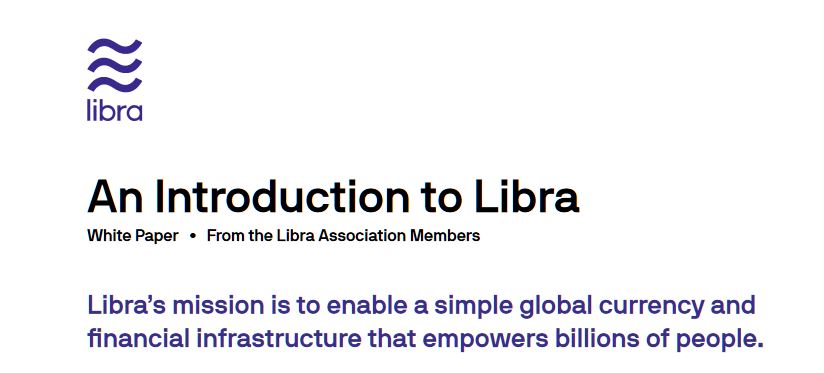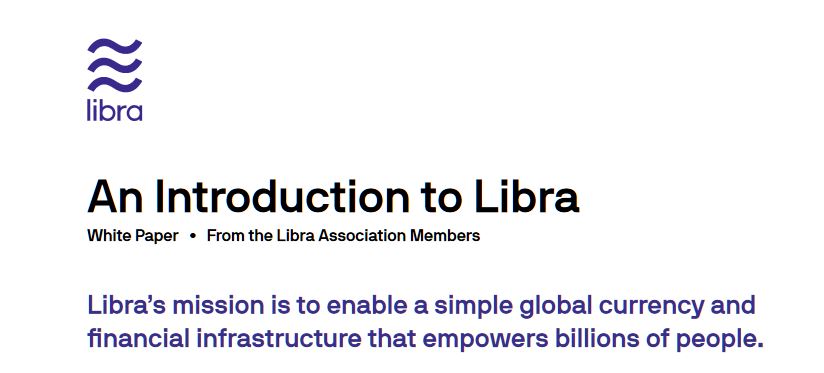The G7 warns against the early deployment of Stablecoins like Libra.
https://www.bis.org/cpmi/publ/d187.pdf

Digital Finance Analytics (DFA) Blog
"Intelligent Insight"
The G7 warns against the early deployment of Stablecoins like Libra.
https://www.bis.org/cpmi/publ/d187.pdf

The G7 warns against the early deployment of Stablecoins like Libra.
Cryptocurrencies have become a global phenomenon in the past few years. Now Facebook is launching it’s own cryptocurrency, in association with Visa, MasterCard, Uber and others. The stated aim of Libra is to “enable a simple global currency and financial infrastructure that empowers billions of people”. Via The Conversation.

The announcement has sparked fears that Libra could be a threat to traditional banks, warnings to be cautious, and sceptical commentary of claims that it will help developing countries.
But let’s go back to the basics and look at what Libra is, how it compares to other cryptocurrencies and whether you should be concerned about using it when it eventually arrives.
Currency is a system of money that is commonly used in exchange for goods and services and, as a result, holds value. Cryptocurrencies are digital currencies that are secured using cryptography.
The more popular recent cryptocurrencies are based on blockchain technology which uses a cryptographic structure that is difficult to change. One of the key properties of this structure is a distributed ledger that keeps account of financial transactions, which anyone can access.
Libra is a new currency that is being proposed by Facebook. It’s considered a cryptocurrency because cryptography will be used to help protect the value of the currency from tampering – such as double spending – and to protect the payment process.
Libra has the potential to become successful because of the backing from the Libra Association, which is made up of large international corporations such as Facebook, Uber and Vodafone. MasterCard and Visa have also thrown their hats in the ring, but no traditional banks are on the list.
Cryptocurrencies like Bitcoin and Ethereum are quite egalitarian in nature. That’s because there is no single authority that verifies transactions between parties, so anyone could potentially do it.
To authorise a Bitcoin transaction you would have to prove that you have done the work, known as a “proof of work”. For Bitcoin, the proof of work is to solve a mathematical puzzle. People who successfully solve the puzzle (proving they have done some work), can add transactions to the blockchain distributed ledger and are rewarded with Bitcoins. The process is known as mining.
The good thing about this is that it reduces fraud. Since anyone can potentially mine Bitcoins, it’s harder to collude as you wouldn’t know who the next person to mine a coin would be. And it’s simple to verify that the person is authorised because anyone can check that the puzzle has been solved correctly.
Based on the initial descriptions of the currency, it sounds like the difference with Libra is that it will verify transactions using a consensus system known as “proof of stake”, or a variation of this method. Under this system, transactions would be authorised by a group of people who have a stake or ownership in the currency.
This makes it easier to predict who the next person to authorise a transaction might be (since there are a relatively small number of authorising group members), and then collude to launder funds without other group members knowing.
It appears the criteria to become a founding member of the Libra Association is to contribute a minimum of US$10 million entrance fee, have a large amount of money in the bank and be able to influence a large number of people.
Cryptocurrencies affect governments and tax systems since they have little to no transaction costs when money is transferred across borders. So while the low transaction costs would be good for everyday users, the advent of a new cryptocurrency with a potentially very large user base has governments and traditional banks very concerned.
While Libra is open source – meaning the source code is available for all to view, use and modify – it’s the members of the association who will be overseeing the currency. Libra could herald a shift away from traditional government taxes and banking fees to a new international monetary system controlled by corporate entities like Facebook and Uber. That’s a concern because of the lack of oversight from regulatory bodies.
The backing of software giants means it’s likely that the user interface for Libra coins would be smooth and simple to use.
Low transaction costs would benefit users and the Libra Association promises to control the value of the currency so that it does not fluctuate as much as other cryptocurrencies. It’s unclear how they plan to do this. But value stability would be a great advantage in times of uncertainty.
The everyday consumer probably wouldn’t know the difference between the “proof of work” and the “proof of stake” mechanisms. But since Facebook has a large database of users that are known to use Libra, it may be able to link Libra transactions to individuals. This could be a privacy concern. (Bitcoin transactions are anonymous because account numbers used in Bitcoin transactions are not linked to an individual’s identity.)
Recent cybersecurity breaches have contributed to a growing awareness of the vulnerabilities of IT systems. As with all software, the Libra implementation and management could be vulnerable to attack, which in turn could mean users could lose their money. But that is a risk that all cryptocurrency users face, whether they are aware of it or not.
No matter what cryptocurrency you choose to use, your funds are still accessible through the same interfaces: a web page or a mobile app. And the way you control access to your personal funds is by authenticating with a password.
Make sure you keep your password safe by making sure it is complicated and hard to guess. Look for applications that allow you to use two-factor authentication and make sure it’s turned on.
Libra is yet to prove its claims of making financial transactions safe and convenient. Only time will tell if its uptake will become widespread following its expected launch next year.
Author: Ernest Foo, Associate Professor, Griffith University
Facebook released their while paper , and it poses a threat to current payment systems. The 29-page paper describes a protocol designed to evolve as it powers a new global currency.

“The Libra Blockchain is a decentralized, programmable database designed to support a low-volatility cryptocurrency that will have the ability to serve as an efficient medium of exchange for billions of people around the world.”
As Libra is a stablecoin, it will have less volatility than a crypto like Bitcoin as it’s tied to the value of real-world currencies. It’s potential is huge.
All over the world, people with less money pay more for financial services. Hard-earned income is eroded by fees, from remittances and wire costs to overdraft and ATM charges. Payday loans can charge annualized interest rates of 400 percent or more, and finance charges can be as high as $30 just to borrow $100.4 When people are asked why they remain on the fringe of the existing financial system, those who remain “unbanked” point to not having sufficient funds, high and unpredictable fees, banks being too far away, and lacking the necessary documentation.
Behind it, is the Libra Association, which is an independent, not-for-profit membership organization based in Geneva, Switzerland. “Members of the Libra Association will consist of geographically distributed and diverse businesses, nonprofit and multilateral organizations, and academic institutions.”
Founding members include:
The reaction from the fintech industry has been positive, though others are concerned about privacy, and risk from Facebook’s existing reach, and are calling for an inquiry into the proposal before it continues. Which ever way you look at it – this is big news.
The fintech industry has expressed excitement over the announcement by Facebook that it was set to introduce a new cryptocurrency to market with the help of some of the biggest names in tech, via InvestorDaily.
The cryptocurrency, dubbed Libra, has been announced by a Facebook white paper stating their mission to empower billions worldwide to enter the financial market.
“The mission for Libra is a simple global currency and financial infrastructure that empowers billions of people,” said the white paper.
The move has been met with excitement by industry players, and general manager of FinTech Australia Rebecca Schot-Guppy said such a rollout would open up new markets and promote fintech innovation.
“Another exciting prospect out of this is that Facebook’s reach may also help finally educate the public on the power of blockchain and cryptocurrency. Calibra [digital wallet for Libra] could take these technologies mainstream and put them at the fingertips of every Australian,” she said.
Co-founder and co-chief executive of Assembly Payments Simon Lee said it seemed like Facebook’s attempting to copy what WeChat and Alipay had done in China.
“We see Calibra as Facebook’s attempt to roll out what is happening in China to the rest of the world. They’ve seen the opportunity and have the scale to execute on it,” he said.
The currency will be built on the Libra blockchain and backed by a reserve of assets designed to give it intrinsic value, but perhaps the biggest nod to consumers is that it will be governed by an independent association.
Facebook has been plagued with user privacy controversies, which would lead many consumers to be sceptical to integrate the social media platform with their financial lives.
However, the Libra Association is their attempt to placate those voices by establishing it as a governing entity that is made up of the likes of Visa, Mastercard, Uber, eBay, Spotify and Vodafone.
The association, according to the white paper, will facilitate the operation of the blockchain and manage the Libra reserve, making them the only party able to mint and burn coins.
The association notes in the white paper that it is important to move towards increasing decentralisation to ensure that there remains a low barrier to entry for the network.
The chief executive of neobank Maslow, Kane Jackson, said the association’s concept showed that Facebook was aware of what was required in order for the coin to thrive.
“Facebook seems to understand that widespread adoption of finance-based products will not be achieved without the decentralisation of their governance and a community-inclusive approach to managing them,” he said.
Facebook has also launched a subsidiary company called Calibra that will handle its crypto dealings in an effort to separate user privacies, meaning Libra payments will not intermingle with Facebook data.
Despite Calibra operating as its own app, the wallet will integrate directly into WhatsApp and Facebook Messenger to utilise the vast network of Facebook to promote cryptocurrency.
It is this network promotion that excites Jasper Lawler, head of research at London Capital Group, who said the network would open other cryptocurrencies to billions.
“Libra will breed familiarity of cryptos to a much wider audience. Two billion people will now be much more open to Bitcoin and other altcoins,” he said.
As Libra is a stablecoin, it will have less volatility than a crypto like Bitcoin as it’s tied to the value of real-world currencies, Mr Lawler said.
“The different properties of a stablecoin compliment rather than compete with cryptocurrencies like Bitcoin, Ethereum and Ripple. Being pegged to regular currencies make stablecoins less volatile and more suited to payment processing,” he said.
The announcement saw an overnight rally for Facebook, but the community will have to wait to see how the rollout of the coin goes as no launch date has been set